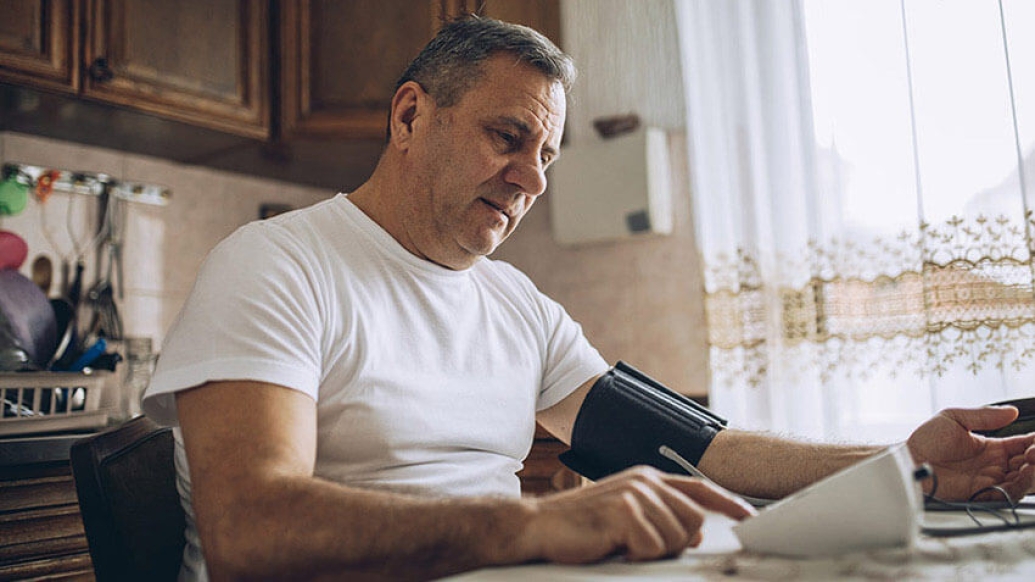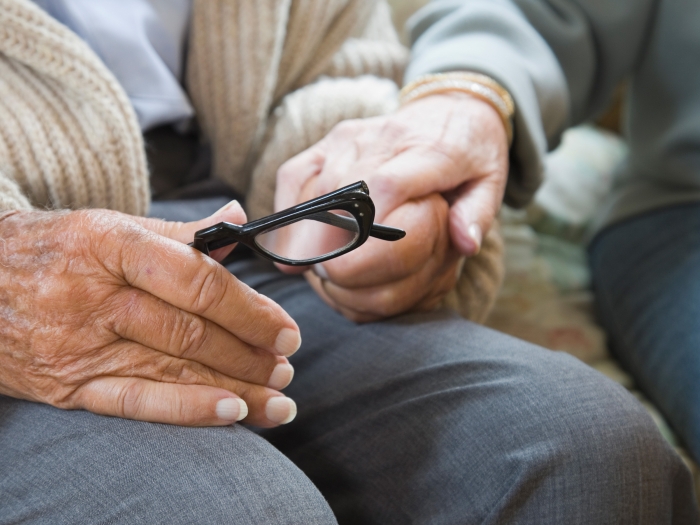Experts see more opportunity to increase home blood pressure monitoring and reporting among people with a range of chronic conditions affected by hypertension
1:30 PM
Author |

More than half of adults between the ages of 50 and 80 have a health condition that puts them at high risk of major health emergencies if they don't keep their blood pressure under control. But a new poll finds less than half of people in this group regularly check their blood pressure at home or in other places outside the health care system.
Even among people with such health conditions who said their health providers encouraged them to check their blood pressure regularly, only about two-thirds actually did.
Exploring the reasons why, and finding ways to prompt more people with these health conditions to check their blood pressure regularly, could play an important role in helping patients live longer and maintain heart and brain health, the poll's authors say. Past research has shown that regular home monitoring can help with blood pressure control, and that better control can mean reduced risk of death and cardiovascular events, including strokes and heart attacks.
MORE FROM THE LAB: Subscribe to our weekly newsletter
The findings come from the National Poll on Healthy Aging, which asked older adults about their chronic health conditions, blood pressure monitoring outside of clinic settings, and interactions with health providers about blood pressure.
The new poll report focuses on responses from the 60% of the poll respondents who said they were either taking a medication to control their blood pressure or had a chronic health condition that requires blood pressure control – specifically, a history of stroke, coronary heart disease, congestive heart failure, diabetes, chronic kidney disease or hypertension (also called high blood pressure).
The poll is based at the University of Michigan Institute for Healthcare Policy and Innovation and supported by AARP and Michigan Medicine, U-M's academic medical center.
"For people with these chronic health conditions, having uncontrolled high blood pressure can substantially increase the risk of death, stroke, heart attack, diabetes complications and kidney failure. That's why national guidelines call for them to check their blood pressures regularly," said Deborah Levine, M.D., M.P.H., a U-M blood pressure researcher who worked with U-M neurologist Mellanie V. Springer, M.D., M.S., M.Sc., and the NPHA team to design, analyze and report on the poll.
"The more that people with these health conditions can monitor their blood pressure between appointments with their doctor, nurse practitioner or other provider, and share readings digitally or over the phone, the more information their provider will have to counsel and treat them," said Springer.
The more that people with these health conditions can monitor their blood pressure between appointments … and share readings digitally or over the phone, the more information their provider will have to counsel and treat them.Mellanie Springer, M.D., M.S., M.Sc.
Owning a home blood pressure monitor matters
In all, 74% of the older adults with blood pressure-related conditions said they had a home blood pressure monitor. Adults who owned a blood pressure monitor were much more likely to measure their blood pressure at home than those who did not own a monitor.
But less than half of those with both blood pressure-related health conditions and a home blood pressure monitor check their blood pressure at least once a week. Nearly one-fifth -- 19% -- never use the montior.
Among those who check their blood pressure at home regularly, 50% share the readings with a health provider.
Among those with blood pressure-related health conditions who did not own a home blood pressure monitor, 54% said it was because it was not needed or they never considered it.
Being encouraged to check matters
National clinical guidelines, which are based on medical evidence and aimed at doctors and other providers to help guide their practice, call for regular home blood pressure monitoring for people with conditions such as the ones the poll asked about. But only 62% of poll respondents with these chronic health conditions said that a health provider had ever told them to measure blood pressure at home.
When the poll team looked further at the responses from this group, they found that adults who had been told by a health provider to check their blood pressure periodically were more than twice as likely to check blood pressure at home than those who were not told.
Like Podcasts? Add the Michigan Medicine News Break on iTunes or anywhere you listen to podcasts.
A doctor's recommendation was cited as a reason for home monitoring by 51% of poll respondents who had a blood pressure-related condition and checked their blood pressure at home regularly. Other motivations for checking blood pressure at home included the most common response of wanting to be as healthy as possible (mentioned by 60%) and the least common response of wanting to prevent a decline in their cognitive ability such as memory and thinking (13%).
This suggests that providers need to emphasize brain health to patients with blood pressure-related conditions. Monitoring and keeping their blood pressure under control can help the brain, as well as heart and kidney health.
"This is an underappreciated effect of good blood pressure control, and one that could be very motivating if older adults understood the link," says poll director Preeti Malani, M.D., a U-M medical professor with training in both geriatrics and infectious diseases. She notes that an earlier NPHA poll found few older adults had spoken to their doctor about preventing dementia.
AARP offers information about the new blood pressure guidelines and tips for effective home blood pressure monitoring, and Michigan Medicine has also created a step-by-step video for taking your blood pressure at home.
"This poll shows that we have more work to do to encourage older adults with certain chronic health conditions to monitor their blood pressure," said Alison Bryant, Ph.D., senior vice president of research for AARP. "We know that the risk of high blood pressure increases with age, so this is an important topic for older adults to discuss with a health provider."
Levine is an associate professor of internal medicine, and Springer an assistant professor of neurology, at the U-M Medical School. Both are members of IHPI and both treat stroke survivors and other patients at the Frankel Cardiovascular Center's Cerebrovascular Program.
The National Poll on Healthy Aging results are based on responses from a nationally representative sample of 2,023 adults aged 50 to 80 from the Ipsos KnowledgePanel who answered a wide range of questions online in January 2021. Questions were written, and data interpreted and compiled, by the IHPI team. Read past National Poll on Healthy Aging reports.

Explore a variety of healthcare news & stories by visiting the Health Lab home page for more articles.

Department of Communication at Michigan Medicine
Want top health & research news weekly? Sign up for Health Lab’s newsletters today!





